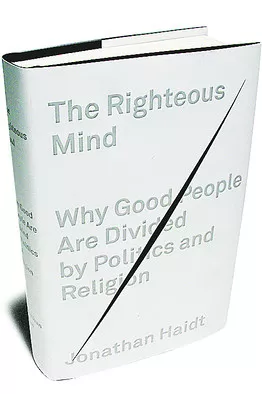Four Symposia Ask: Why Are Good People Divided by Politics and Religion?

If you find yourself enflamed by political discourse and perplexed by opposing views, the problem may not be the irrationality of your opponent - it may be that you have yet to master one of the most challenging skills of the sophisticated mind: The ability to not only tolerate your polar opposite, but have a deep and meaningful understanding of their perspective.
Jonathan Haidt's The Righteous Mind: Why Good People are Divided by Politics and Religion seeks to address one of the more polarizing aspects of American life - the lack of understanding between liberals and conservatives. His book and its claims, which are derived from a collective look at social psychology, evolutionary biology, sociology and philosophy, will be the topic of four symposia designed to inspire productive dialogue on the topic of mutual understanding for the "other." The symposia are offered to all members of the Swarthmore community and will be led by a small group of faculty members, including co-organizers Barry Schwartz, Dorwin P. Cartwright Professor of Social Theory and Social Action, and Professor Emeritus of Philosophy Richard Schuldenfrei.
"The book brings to bear the theoretical issues in liberal arts and it applies it to practical ones - the liberal arts as a part of democratic life," Schuldenfrei says. "The greatest pay-off of a liberal education is being able to see the world in more subtle and sophisticated ways. The ability to truly see the different sides of a divide is more valuable than anything else you can ask for in a liberal arts education. It is very difficult to have conversations with people who see the world in a completely different way and to actually understand where they're coming from. It is no mean feat to get inside people's worlds and find out why they think the way they do."
To understand how others see the world and come together for a greater good is "a significant achievement," Schuldenfrei said, and this book - as well as the subsequent discourse-seeks to do that.
The Righteous Mind, which was reviewed in the New York Times by William Saletan '87, brings several concepts to the forefront that many liberals would likely find surprising, including the argument that liberals are worse at predicting the moral judgments of moderates and conservatives than their counterparts, despite believing themselves to be open-minded and rational.
Rationality is another concept that is closely studied in Haidt's discourse and will play a substantial role in the symposia dialogue, which includes talks on religion, morality, social cohesion and the moral differences between liberals and conservatives. In The Righteous Mind, Haidt argues that people are more intuitive than rational; therefore, their personal perspectives are motivated by their own conclusions.
"It's like when a hungry man and a cold man come across a tree at the same time. The hungry man will think about the fruit. The cold man will think about the firewood," Schuldenfrei says.
In the liberal arts tradition, Haidt's case draws from a range of academic disciplines, including biology, economics, history, philosophy, political science, religion, and sociology.
A series of four conversations about The Righteous Mind will be hosted:
- The Limits of Reason in Moral Thinking, Tues., Oct. 9, 2012 at 7:30 p.m. in the Scheuer Room. With Associate Professor of Economics Amanda Bayer, Professor of History Timothy Burke, McDowell Professor of Philosophy Richard Eldridge, and Darwin Cartwright Professor of Social Theory and Action Barry Schwartz.
- Moral Differences between Liberals and Conservatives, Tues., Oct. 30, 2012 at 7:30 p.m. in the Scheuer Room. With Associate Professor of Political Science Ben Berger, Associate Professor of Anthropology Farha Ghannam, Richter Professor of Political Science Carol Nackenoff, and Professor Emeritus of Philosophy Richard Schuldenfrei.
- Morality and Evolution, Feb. 12, 2013 at 7:30 p.m. in the Scheuer Room. With Professor of Psychology Frank Durgin, Assistant Professor of Biology Vince Formica, Schneiderman Professor of Biology Scott Gilbert, and Turner Professor of Philosophy Hans Oberdiek.
- Religion and Social Cohesion, March 5, 2013 at 7:30 p.m. in the Scheuer Room. With Associate Professor of Religion Tariq al-Jamil, Swarthmore College President Rebecca Chopp, Claude Smith Professor of Political Science James Kurth, and Assistant Professor of Anthropology Christy Schuetze.
The series will conclude with a public talk, given by the author, on April 9, 2013.
The events around the symposia have been made possible with funding and administrative support from the Swarthmore College Institute for the Liberal Arts. The Institute serves as a framework for the College to explore the liberal arts model and the sector's relevance to the wider community. The Institute also hosts the Second Tuesday Science Cafe, geared toward individuals who have no formal science background but have a curiosity about sicence and a willingness to learn about new concepts. The Science Cafes, open to the College community, are held from noon-1 p.m. in the Scheuer Room. The October 9 talk, led by Assistant Professor of Statistics Lynne Stuerele Schofield '99, will focus on Pennsylvania's high-stakes testing system.



